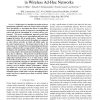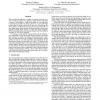1212 search results - page 193 / 243 » Optimizing Communication in Time-Warp Simulators |
MOBICOM
2004
ACM
14 years 3 months ago
2004
ACM
Topology control algorithms usually reduce the number of links in a wireless network, which in turn decreases the degree of connectivity. The resulting network topology is more su...
ISCA
2010
IEEE
14 years 3 months ago
2010
IEEE
Numerous studies have shown that datacenter computers rarely operate at full utilization, leading to a number of proposals for creating servers that are energy proportional with r...
INFOCOM
2002
IEEE
14 years 2 months ago
2002
IEEE
There has been a surge of interest in the delivery of personalized information to users (e.g. personalized stocks or travel information), particularly as mobile users with limited ...
ICC
2000
IEEE
14 years 2 months ago
2000
IEEE
—In this paper we introduce the notion of power management within the context of wireless ad-hoc networks. More specifically, we investigate the effects of using different trans...
SIGCOMM
1999
ACM
14 years 2 months ago
1999
ACM
The conventional approach to routing in computer networks consists of using a heuristic to compute a single shortest path from a source to a destination. Single-path routing is ve...


